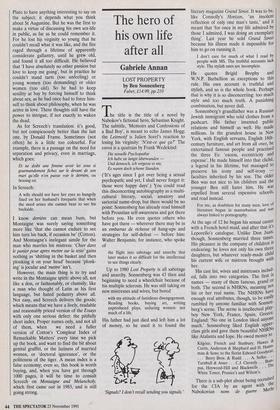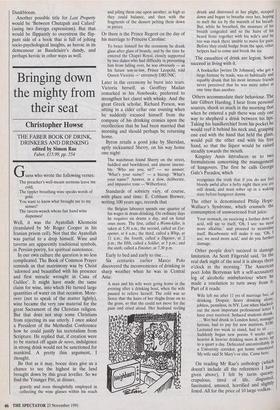The hero of his own life after all
Gabriele Annan
LOST PROPERTY by Ben Sonnenberg Faber, £14.99, pp.210 The title is the title of a novel by Nabokov's fictional hero, Sebastian Knight. The subtitle, 'Memoirs and Confessions of a Bad Boy', is meant to echo James Hogg; the Leitmotif is Julien Sorel's reaction to losing his virginity: Vest-ce que ca?' The envoi is a quatrain by Frank Wedekind:
Die seruelle Psychopathie kh habe sie langst iiberwunden — Und dennoch, ich vergesse es nie, Es waren doch schone Stunden.
(It's ages since I got over being a sexual psychopath; and yet, I shall never forget it: those were happy days'.) iou could read this disconcerting autobiography as a multi- cultural literary, social, amatory and sartorial name-drop, but there would be no point: Sonnenberg has already read himself with Proustian self-awareness and got there before you. He even quotes others who have got there — wherever there may be in an embarras de richesse of hang-ups and strategies for self-defeat — before him: Walter Benjamin, for instance, who spoke of
the flight into sabotage and anarchy that later makes it so difficult for the intellectual to see things clearly.
Up to 1980 Lost Property is all sabotage and anarchy. Sonnenberg was 43 then and beginning to need a wheelchair because of his multiple sclerosis. He was still taking on new mistresses and wives, but bored
with my attitude of fastidious disengagement. Reading books, buying art, writing unproduced plays, seducing women: not much of a life.
His father had just died and left him a lot of money, so he used it to found the 'Signals? I don't recall sending you signals.' literary magazine Grand Street. It was to be, like Connolly's Horizon, 'an insolent reflection of only one man's taste,' and it meant that 'for once in my life admired by those I admired, I was doing an exemplary thing'. Last year he sold Grand Street because his illness made it impossible for him to go on running it.
I don't care for much of what I read by people with MS. The truthful accounts lack style. The stylish ones are incomplete.
He quotes Brigid Brophy and W.N.P. Barbellion as exceptions to this rule. His own account is truthful . and stylish, and so is the whole book. Perhaps that is why it is so disconcerting: too much style and too much truth. A punishing combination, but never dull.
Sonnenberg's grandfather was a Russian Jewish immigrant who sold clothes from a pushcart. His father invented public relations and himself as well. He made millions. In the grandest house in New York, with English servants, English 18th- century furniture, and art from all over, he entertained famous people and practised the three Es: 'excess, eccentricity and expense'. He made himself into that cliche, a legend in his lifetime, but managed to preserve his irony and self-irony --' faculties inherited by his son. The older Ben was not nice to his children and the younger Ben still hates him. He was expelled from several expensive schools, and read instead.
For me, as doubtless for many men, love of literature began in masturbation and was always linked to pornography.
At the age of 12 he began his sexual career with a French hotel maid, and after that it's Leporello's catalogue. Unlike Don Juan, though, Sonnenberg married three times. His pleasure in the company of children is endearing: he loves not only his own three daughters, but whatever ready-made child his current wife or mistress brought with her.
His cast list, wives and mistresses includ- ed, falls into two categories. The first is names — many of them famous, grand or both. The second is NHRNs, meaning lint his or her real name. The NHRNs have enough real attributes, though, to be easily rumbled by anyone familiar with Sonnen- berg's scene. The scene is intellectual play- boy New York, France, Spain, Greece, England: 'No one in London liked anyone much.' Sonnenberg liked English upPa" class girls and gave them beautiful NHRNs like Atalanta and lope. He owed money to Kilgour, French and Stanbury, Hawes 84 Curtis, Anderson & Shephard and H. Hunts- man & Sons; to the florist Edward Goodyear, . .. Berry Bros. & Rudd... A. Sulka. • • • Turnbull & Asset'. . . C.J. Cleverly. . • Bt2,L171- pus, Heywood-Hill and Blackwells . . • "c White Tower, Prunier's and Wilton's.
There is a sub-plot about being recruited for the CIA by an agent with the Mere Nabokovian nom de guerre Dankbloom.
Another possible title for Lost Property would be 'Between Chutzpah and Cafard' (using two foreign expressions). But that would be flippantly to overstress the flip- pant side of a book that is full of jolting socio-psychological insights, as heroic in its demeanour as Baudelaire's dandy, and perhaps heroic in other ways as well.









































































 Previous page
Previous page